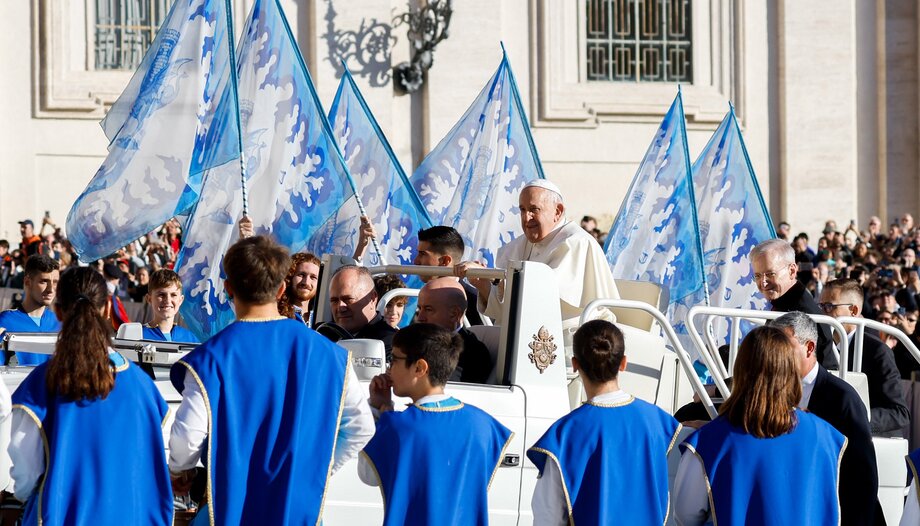In the catechesis on the Passion for the evangelizationThe Pope, the apostolic zeal of the believer, who this morning completed his 25th session since January, has fixed his gaze on the Audience in the venerable French Madeleine Delbrêl, with the theme "The joy of faith among non-believers", and the Gospel passage in which Jesus speaks of the salt of the earth and the light of the world.
The Servant of God Madeleine Delbrêl (1904-1964), a social worker, writer and mystic, lived for more than thirty years, together with other companions, in the poor and working-class suburbs of Paris, Francis explained. "This choice to live on the peripheries allowed her to discover the love of God in everyday life and to make it known to those farthest away with a simple and fraternal lifestyle".
After an agnostic adolescence, Madeleine came to know the Lord. She set out in search of God, responding to a deep thirst she felt within herself. "The joy of faith led her to choose a life entirely dedicated to God, in the heart of the Church and in the heart of the world, sharing simply in fraternity the life of the people of the street."
"Marxist ideology environments."
From her life witness, the Pontiff underlined in particular that "in that environment, where Marxist ideology predominated, she was able to experience that 'it is by evangelizing that we are evangelized'." "Madeleine's life and writings show us that the Lord is present in every circumstance and that he calls us to be missionaries here and now, sharing life with the people, participating in their joys and sorrows."
The Venerable Frenchwoman teaches us, the Pope said, that "secularized environments also help us to convert and strengthen our faith," Francis stressed. "Let us not forget that life in Christ is "an extraordinary and extraordinarily gratuitous treasure," which we are called to share with everyone."
In "secularized" places
In his words to the French-speaking pilgrims, the Pope also reflected on the idea that we are evangelized by evangelizing. "With her heart always on the move, Madeleine allowed herself to be challenged by the cries of the poor and non-believers, interpreting them as a challenge to awaken the missionary aspiration of the Church. She sensed that the God of the Gospel must burn in us to the point of bringing his Name to all those who have not yet encountered him".
"Madeleine Delbrêl also taught us that we are evangelized by evangelizing, that we are transformed by the Word we proclaim. She was convinced that secularized environments are places where Christians have to struggle and can strengthen the faith that Jesus gave them."
Greeting the Spanish-speaking pilgrims, Francis returned to the same idea: "Let us ask the Lord to give us his grace to be courageous witnesses of the Gospel, especially in secularized environments, helping us to discover the essentials of the faith and strengthening us in difficulties. May Jesus bless you and the Blessed Virgin Mary watch over you".
Contact with non-believers
In another moment of the Audience, Pope Francis said "Contemplating this witness of the Gospel, we too learn that in every situation and personal or social circumstance of our lives, the Lord is present and calls us to live our time, to share the life of others, to mingle with the joys and sorrows of the world".
In particular, the Holy Father added, the Venerable Madeleine Delbrêl "teaches us that even secularized environments are useful for conversion, because contact with non-believers provokes in the believer a continuous revision of his way of believing and a rediscovery of the faith in its essentiality".
"Just peace" in the Holy Land
In addressing the Italian-speaking faithful, the Pontiff referred to Holy Land and to UkraineLet us think and pray for the peoples suffering from war. Let us not forget the martyred Ukraine, and let us think about the peoples Palestinian e Israelimay the Lord bring us a peace just. We suffer so much. The children suffer, the sick suffer, the elderly suffer, and so many young people die. War is always a defeat, let us not forget that. It is always a defeat.
The Pope also recalled that "tomorrow we will celebrate the liturgical feast of the Dedication of the Basilica of St. John Lateran, the Cathedral of Rome. May this anniversary awaken in everyone the desire to be living and precious stones, used in the construction of the House of the Lord".
"Let us pray for the deceased".
The petition for the deceased came when addressing the Portuguese-speaking pilgrims. "This month revives in us the nostalgic memory of our dead. They left us one day with a request, tacit or explicit, for our spiritual help in their passage to the beyond. We know that our prayers for them reach Heaven, and so we can accompany them there, strengthening the ties that bind us to eternity. Let us pray for them!" prayed Francis.
In his greeting to the Poles, he pointed out that "in a few days you will celebrate the anniversary of the recovery of Poland's independence. May this anniversary inspire you with gratitude to God. Pass on to the new generations your history and the memory of those who have preceded you in generous Christian witness and in love for your homeland. I bless you from my heart".
As usual, the Holy Father also addressed the pilgrims of other languages: English, German and Arabic, and concluded with the Our Father and the Apostolic Blessing.







